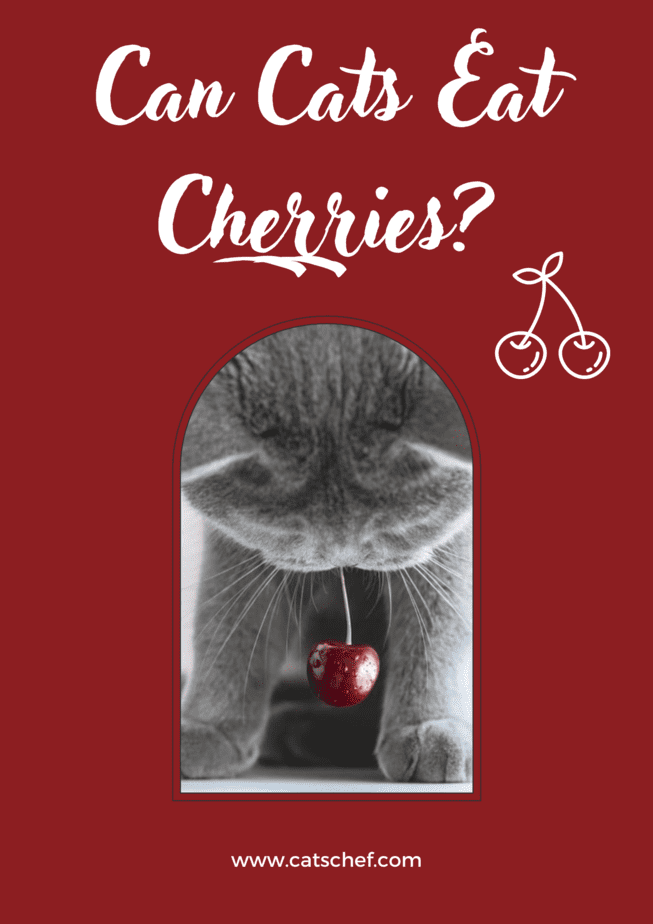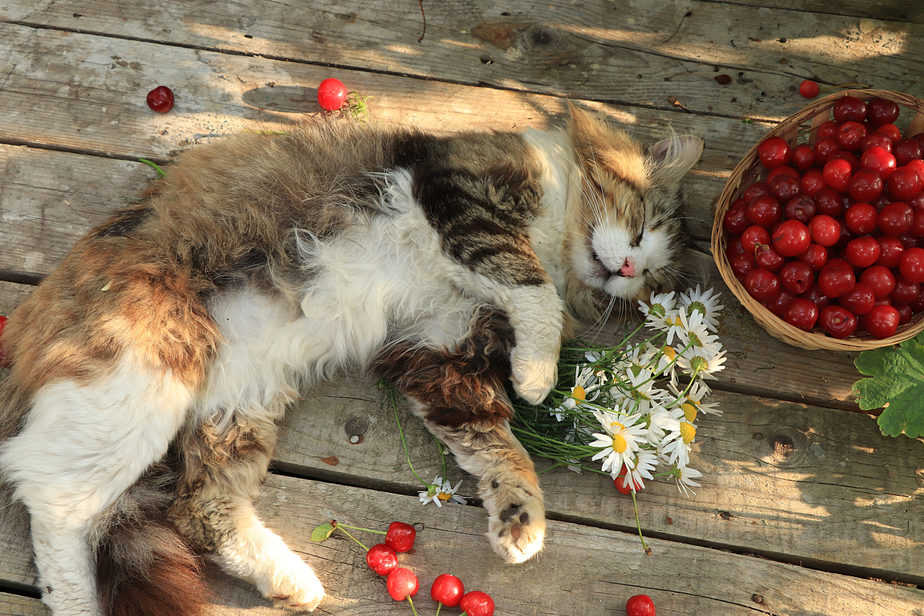Sometimes, we feel the need to share our food with cats. This isn’t a bad thing, right? Well, this isn’t a question we can offer a simple answer to. Sometimes, sharing is caring, and other times, it’s not. If you’re wondering, “Can cats eat cherries?” the answer is unfortunately complicated.
Cats are obligate carnivores – a widely known fact. But, a few bits of fruits now and again can’t hurt, right? This makes us wonder if cats can eat, for example, cherries.
However, it’s dependent on the type of fruit in question. Some may be useful, while others may pose a risk to their health.
Cats, on the other hand, shouldn’t eat fruits as their primary source of nutrition. They may aid with nutrient intake, but unless it’s a special occasion, stick to the meat.
Fruits often lack the necessary protein content for felines. They can provide some health supplements, such as vitamins and minerals, but they can’t replace protein.
Are cherries dangerous to cats?
This may be confusing, but yes and no. Certain parts of cherries are poisonous to felines, while others are safe to consume. We know this can sound bad, but stick with us to find out why and what parts could cause trouble.
Unlike blackberries that are totally safe for your pet, you’ll have to be extra cautious when it comes to cherries. Certain problems may arise if you divert your attention from your pet for just one second. Cat owners know that best, as their furkids are curious by nature, and that means trouble.
Can cats eat cherries?
Your pet may not be interested in these fruits whatsoever. Cherries don’t have a high nutritional value for cats who need predominantly protein.
However, cats can eat ripe cherry flesh without any problems. These can offer a number of health benefits to your furbaby.
The flesh of the cherry is packed with antioxidants. These are beneficial to your pet’s immune system as they can help fight free radicals in the body. This means that they have antibacterial, as well as anti-inflammatory properties.
Antioxidants help prevent certain diseases from developing and help reduce the damage done by pollution, radiation, or inflammation.
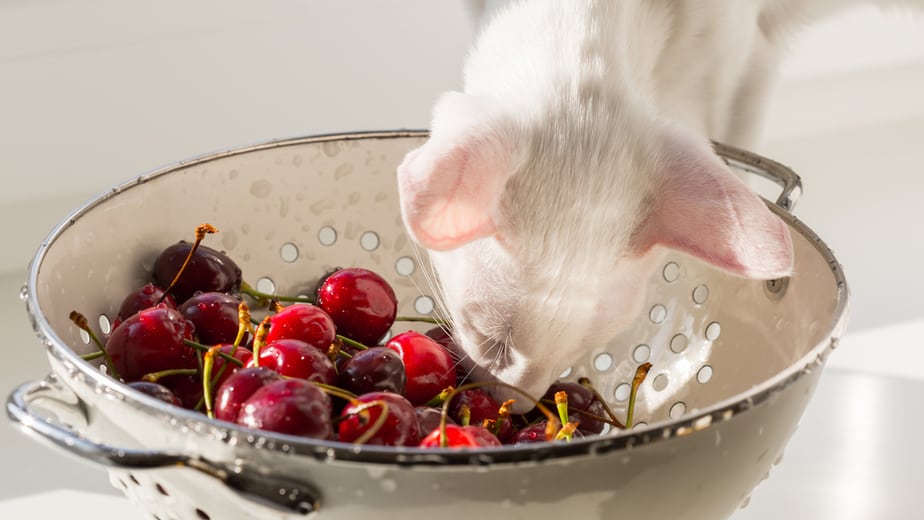
1. Vitamins and minerals
Two of the most significant nutrients are found in cherries. Well known as among the most important minerals for bone strength are calcium and manganese. They also aid in the formation of connective tissue and the management of blood sugar.
Cherries are also loaded with vitamin C. We’ve always known cats are greater than us. If you didn’t already know, their bodies are able to produce vitamin C on their own. So, while we depend on a variety of foods to obtain the necessary amounts, they simply produce this vitamin in their liver!
Cherries, on the other hand, are a strong source of this vitamin, and the extra amounts can be beneficial. Vitamin C aids in the formation of collagen when combined with iron. This means it’s great for your pet’s razor-sharp blades (aka teeth and claws), as well as bones.
As if this wasn’t enough, these little fruits contain another essential mineral – copper. It assists in red blood cell production, forms collagen, and helps with iron absorption. This mineral is an antioxidant that protects the cells from damage.
Potassium is an electrolyte that aids in the correct functioning of muscles and organs. It’s especially important for older, sick cats who have lost electrolytes due to vomiting or diarrhea.
Vitamin K is also found in cherries, and is essential for a cat’s body to properly coagulate blood.
Another important nutrient is Vitamin A, which aids in the maintenance of good vision, bone growth, and reproductive function, as well as skin health. It also helps maintain healthy teeth.
2. Other nutrients
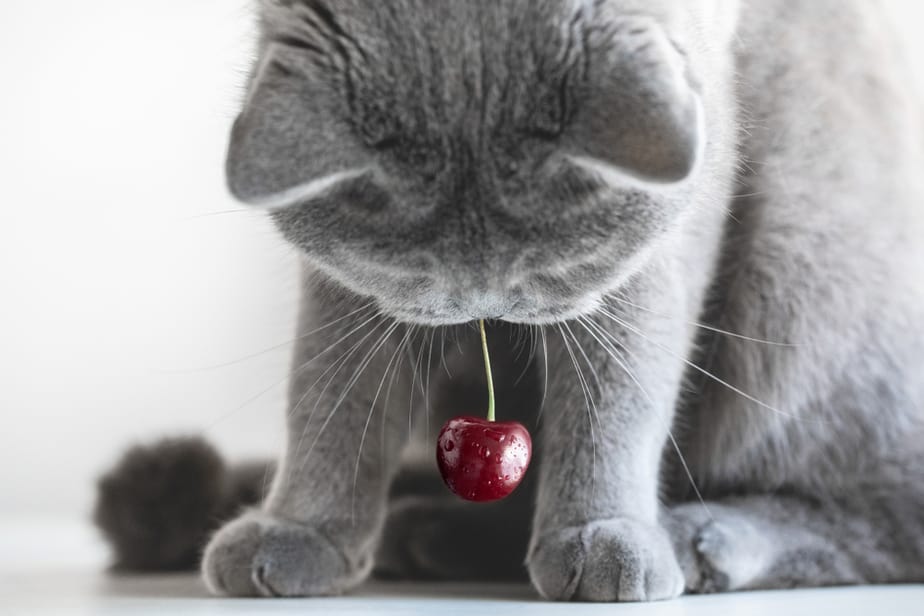
Protein is a vital nutrient in a cat’s diet, and your feline companion will grow ill rapidly if she doesn’t get enough. Cherries contain small amounts of protein, but it isn’t enough to fulfill her daily need. The drawback is that this protein is derived from plants.
Cats have a difficult time digesting plant material, which is why the protein present in cherries may go to waste. A few cherries aren’t going to be enough to replace her main source of sustenance.
Next to protein, these fruits are high in fiber. Fiber has both positive and negative aspects.
To be more exact, moderate levels of fiber are beneficial to your pet, while excessive amounts can be harmful. This means that cats require certain levels of this nutrient to aid in digestion.
Fiber may aid her if she’s having problems doing her business in the litter box. It helps transport food through the digestive tract and also prevents diarrhea.
Just as is the case with blackberries, you have to be careful while feeding her these. This is due to the fact that too much of this nutrient can cause digestive tract issues. While moderate levels of fiber can aid in loose stools, excessive fiber can promote constipation in cats.
Make sure to provide your pet with high-quality, cat-appropriate foods that are nutritionally balanced.
Drawbacks to cats eating cherries
You can’t have good without bad, right? This also applies to cherries, so here are a few reasons and how they could harm your kitto.
Along with all the health benefits listed above, cherries are also abundant in calories and carbs.
Like all fruits, cherries are high in sugars. Carbohydrates are not tolerated by cats. They are derived from plants, and cats and plants don’t really get along. Because felines are carnivores, that means they prefer to eat animals.
While a few cherries here and there won’t hurt, the nutrients in these fruits won’t be adequately digested. Carbs aren’t necessary for a feline’s diet because she can’t digest them completely.
Too many carbs lead to weight gain. Additional pounds may look cute, but can also be quite detrimental to your pet’s health. We all adore chonky cats, but when your furkid’s at risk, it isn’t so cute after all.
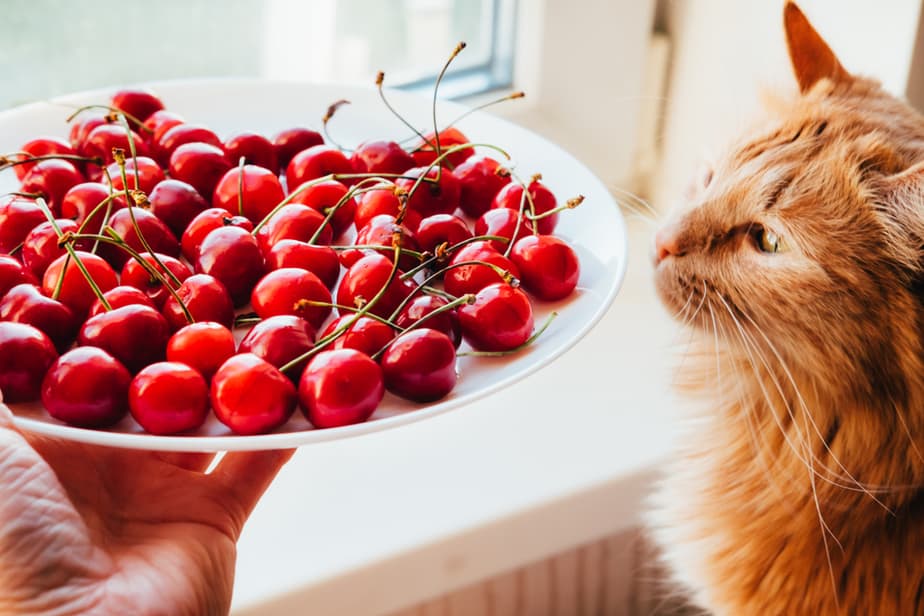
Can cats eat cherry leaves and pits?
This is the part where you should be concerned. Not to be a whiner, but you should never let your cat play with cherries. Cats can eat cherry flesh – it’s perfectly safe for her. Meanwhile, other parts are poisonous.
This includes leaves, stems, pits, and any other part of the cherry that isn’t flesh. Cherries are dangerous to felines because of the presence of cyanide.
Cyanide is produced when the seeds come into contact with acids in a cat’s digestive system. This is a plant toxin that can be found in seeds, stems, and leaves of a cherry. It can even be harmful to people, resulting in gastrointestinal distress.
Early symptoms of cyanide poisoning include headaches, difficulty breathing, dizziness, vomiting, and an increased heart rate. After that, your feline could be at risk of seizures, low blood pressure, a slowed heart rate, and cardiac arrest.
Because cyanide impairs the body’s ability to transport oxygen, cats who have been poisoned by cherries may be unable to breathe. It’s crucial to contact your veterinarian as soon as you discover these symptoms in your cat.
Though cyanide poisoning is the biggest danger with cherries, there are a few other health risks for cats. Choking or bowel obstruction can also be caused by the pit.
Meanwhile, felines should avoid cherries because of their high sugar content, especially if they are seniors or have an underlying health condition, such as diabetes.
Cherry allergy in cats
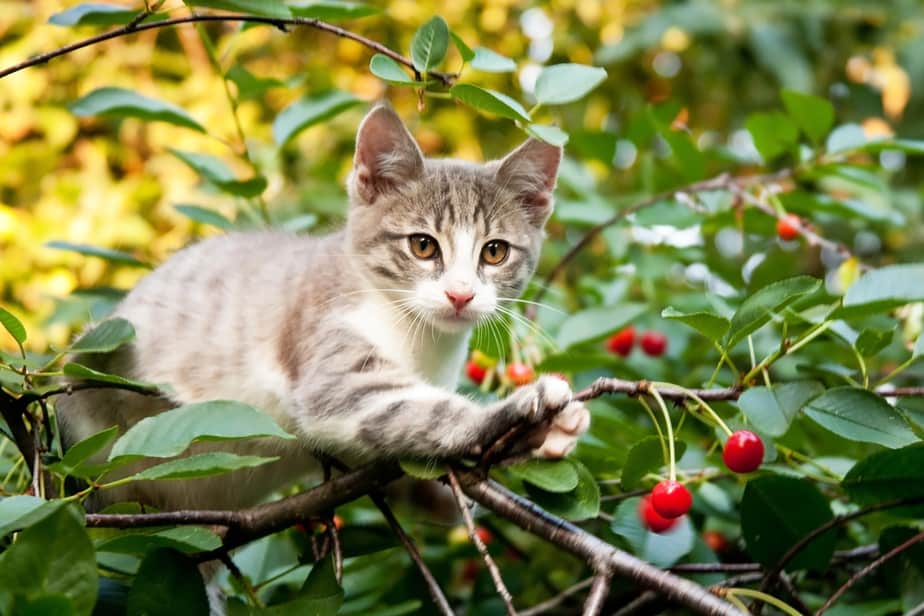
You should ask yourself if cats can eat cherries or any other “human” foods before introducing them. Maybe it’s unheard of, but just like humans, felines can have food allergies.
The most common food allergies in cats include chicken, milk, and grain allergies. And just like their two-legged companions, cats can be born with these or develop them later in life.
If your pet is trying cherries for the first time, make sure to monitor her behavior. If you notice any unusual signs or symptoms, it’s possible she’s having an allergic reaction. This could include diarrhea, vomiting, abdominal pain, and rashes.
Your cat may sneeze excessively and/or have trouble breathing. If this is the case, make sure to take an emergency trip to the vet!
You can never be sure whether your pet’s allergic to something, so it’s best to introduce new foods as slowly as possible.
How and when to feed cherries?
Now you know what part of the cherry is edible for cats and what parts are not. So, if you want to offer a few cherries to your furry friend, make sure to be thorough when cleaning them up for her.
Cats can eat cherries, but get ready for some work. Properly prepared cherries can be a great snack for your furkid, but are they really worth it? You have to watch out for any leaves, stems, pits, and cherry blossoms that might get in her bowl.
If you’re keen on succeeding, you might freeze up some of these fruits and serve them as cold snacks. Freezing them up in ice cubes is a good way for your cat to have fun and keep her hydrated. Your goofy, curious pet would be more than eager to try and lick some of this new food.
Even if you manage to clean up some of these fruits, there are other risks. If you’re not growing cherries in your own garden, there’s a risk of your pet ingesting pesticides. We know humans eat these all the time, but cats don’t.
If your cat is exposed to pesticides all the time, she could land up with poisoning. The chemicals found in these can cause respiratory problems and seizures, to name a few.
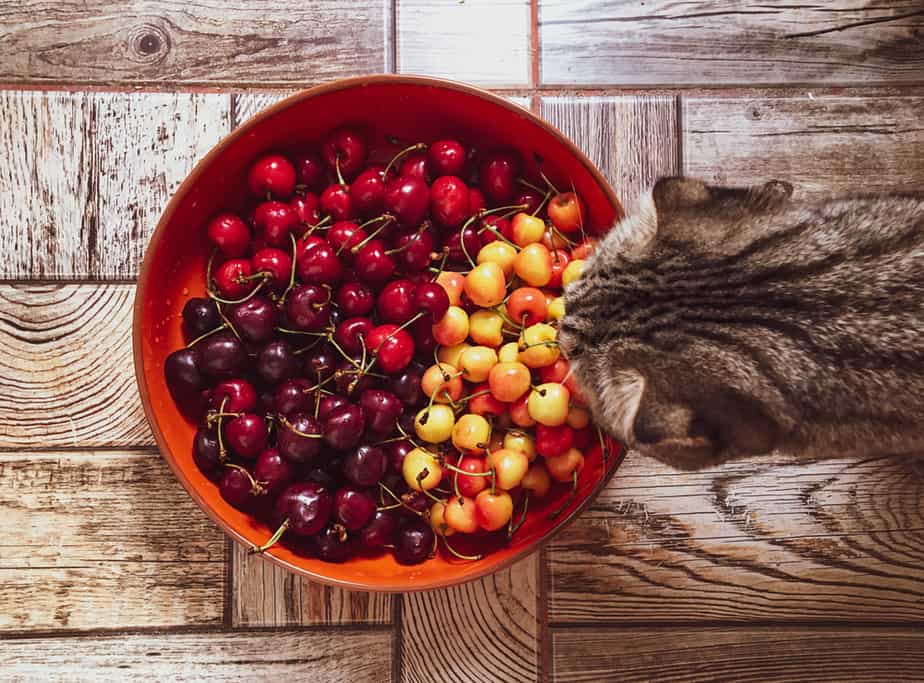
Final verdict
Cats can eat cherries, but only if they’re stripped of any parts except the flesh. Leaves, stems, pits, and any other parts are considered toxic to cats. The cyanide presence in cherries could harm your pet and cause severe medical problems.
These fruits are high in fiber and while normal amounts can benefit your cat, too much can cause problems. Constipation becomes a real issue if your pet feasts on high-fiber foods, and diarrhea is a possible side effect of your pet not getting enough of it.
Other than that, cherries are a healthy snack for both you and your furkid. They’re abundant in vitamins, minerals, and also have traces of protein.
While the protein is plant-derived, it could still be a great addition to her regular meat-based diet.
Read more: Can Cats Eat Lychee? Should They Aim For This Fruit?
